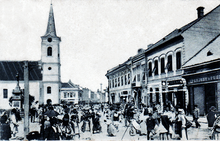Trojan Bacsila
Trojan Bacsila , Romanian : Traian Băcilă , (* December 23, 1867 in Caransebeş ; † June 10, 1931 in Vienna ) was an imperial and royal major general of Romanian origin.
biography
Trojan Bacsila, son of a deceased Austro-Hungarian first lieutenant at the military border, entered the Theresian Military Academy in Wiener Neustadt from the military high school in Mährisch Weißkirchen in 1885 , was retired in 1888 as a lieutenant in the Hungarian infantry regiment Emperor Leopold II. 33, on Promoted to first lieutenant on May 1, 1892, assigned to the General Staff and transferred to the Hungarian Infantry Regiment Freiherr von Schikofsky No. 83. In 1900 he was promoted to captain 1st class in the General Staff Corps in the 12th Infantry Corps in Sibiu and on May 1, 1907, he became Major and Chief of Staff of the 27th Infantry Division. In 1909 he became the commander of the Royal Bulgarian Military Merit Order (granted October 24th of that year).
On January 3, 1914, Bascila advanced to the position of colonel and commander of the Ernst Freiherr von Loudon infantry regiment No. 29 in Vienna and Nagybecskerek . The officer then became Colonel Brigadier of Infantry Brigade No. 61 in Army Corps No. 5 under Field Marshal Lieutenant Ferdinand Ritter von Goglia. During the First World War , Colonel General von Böhm-Ermolli ordered the reserves of the V Corps, Infantry Regiment No. 72 and parts of Infantry Regiment No. 44 under Colonel Brigadier Bacsila, to Troscianiec at the end of July 1916 . He was supposed to support the corps on the right flank in the upcoming battle at Zalosce (August 4th to 8th), while the army reserve next to the Brody - Lemberg railway line (infantry regiment No. 12 and three battalions of infantry regiment No. 3) moved behind the 31st Infantry Division. On the right wing of 5th Corps, the advance of Colonel Bascila's brigade, now with infantry regiments No. 32 and No. 12, on Hnidawa and Ratyszcze, ordered the day before, was not carried out. The intervention of the German 197th Infantry Division , which was approaching from Lemberg to Zloczów and Zborów , should be awaited and deployed later.
The bearer of the Order of the Iron Crown 3rd Class (KD.) , The Military Merit Cross 3rd Class (KD.) And the Iron Cross 2nd Class was awarded on August 1, 1917 (rank of September 2 of the year ) promoted to major general and commander of the 144th Infantry Brigade.
After the collapse of the monarchy, the general retired on January 1, 1919, but did not return to his homeland, but stayed in Vienna for family reasons, where he also died. His wife, Adele, a teacher, wrote the book “Anstandslehre und Hausskunde” (1910). One of his children was Erwin (born January 27, 1910 in Budapest , † March 3, 1982 in Vienna), a highly decorated (including the Knight's Cross of the Iron Cross and the German Cross in Gold ) Air Force major in World War II .
Individual evidence
- ↑ Johann Svoboda: "The Theresian Military Academy in Wiener-Neustadt and their pupils 1838-1893", Volume 2, KK Hof- und Staatsdruckerei., Vienna 1894, p. 801
- ^ Ordinance sheet for the Austro-Hungarian Army: Personnel Affairs, Volume 48, KK Hof- und Staatsdruckerei., Vienna 1899, p. 132
- ↑ http://www.taraalmajului.ro/IonIovescu.pdf
- ↑ Schematism for the imperial and royal army and for the imperial and royal navy, Verlag KK Hof- und Staatsdruckerei., Vienna 1900, pp. 132, 204
- ↑ Schematism for the imperial and royal army and for the imperial and royal navy, Verlag KK Hof- und Staatsdruckerei., Vienna 1907, p. 214
- ↑ Wiener Zeitung No. 245, from Sunday, October 24, 1909, p. 1
- ^ Ordinance sheet for the Austro-Hungarian Army: Beiblatt, Volume 21, KK Hof- und Staatsdruckerei, Vienna 1914, p. 189
- ↑ Edmund Glaise von Horstenau, Rudolf Kiszling: "Austria-Hungary's last war, 1914-1918", volume: The war year 1916, 2nd part: "The events from August to the turn of the year", Verlag Militärwissenschaftlichen Mitteilungen, Vienna 1934, p. 174 ff.
- ↑ Book of Honor of the Austro-Hungarian Wehrmacht: The Award Winners in World War I, Volume 1, Verlag Vaterländisches Archiv, Vienna 1917, p. 96
- ↑ a b Antonio Schmidt-Brentano: The kk or kuk Generalität 1816–1918, Austrian State Archives, 1907, p. 8
- ↑ http://www.weltkriege.at/Generalitaet/05%20Generalmajor/genmaj1.htm
- ↑ Karin Schrott: "The normative corset: regulations for women in society and the public in the German-language decency and behavior literature between 1871 and 1914", Verlag Königshausen & Neumann GmbH, Würzburg 2005, p. 301
- ↑ http://www.luftwaffe.cz/bacsila.html
| personal data | |
|---|---|
| SURNAME | Bacsila, Trojan |
| ALTERNATIVE NAMES | Băcilă, Traian |
| BRIEF DESCRIPTION | Hungarian-Austrian major general |
| DATE OF BIRTH | December 23, 1867 |
| PLACE OF BIRTH | Caransebeş |
| DATE OF DEATH | June 10, 1931 |
| Place of death | Vienna |


